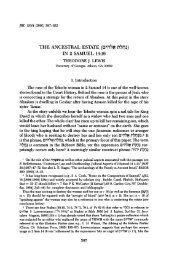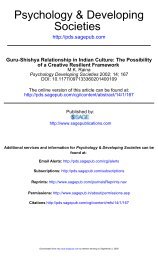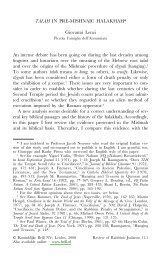Religion, Theology, and Philosophy on the Way to Being and Time ...
Religion, Theology, and Philosophy on the Way to Being and Time ...
Religion, Theology, and Philosophy on the Way to Being and Time ...
You also want an ePaper? Increase the reach of your titles
YUMPU automatically turns print PDFs into web optimized ePapers that Google loves.
I. M. Fehér / Research in Phenomenology 39 (2009) 99–131 109<br />
Th e fl ow of Heidegger’s critical c<strong>on</strong>siderati<strong>on</strong>s is, as can be seen, wholly<br />
phenomenological. It is completely in line with Husserl’s “principle of all principles”<br />
22 which suggests that what it comes down <strong>to</strong> is <strong>to</strong> proceed in an unprejudiced<br />
way, without any prior bias, <str<strong>on</strong>g>and</str<strong>on</strong>g> <strong>to</strong> simply accept whatever is off ered<br />
us in intuiti<strong>on</strong>. It would indeed be hard <strong>to</strong> deny that it is not as zoological<br />
objects that we primarily do experience ourselves in <strong>the</strong> world of natural<br />
attitude—that in order <strong>to</strong> experience ourselves in that way we must previously<br />
have shifted over in<strong>to</strong> an attitude of a particular <strong>the</strong>ory.<br />
Th e (phenomenological) implicati<strong>on</strong>s of this most phenomenological criticism<br />
of phenomenology for a radicalizati<strong>on</strong> or transformati<strong>on</strong> of it are simple<br />
enough: an attempt should be made <strong>to</strong> experience <strong>the</strong> intenti<strong>on</strong>al being more<br />
originally, in a more unprejudiced way, in its “natural” setting, <strong>the</strong>reby no l<strong>on</strong>ger<br />
taking <strong>the</strong> traditi<strong>on</strong>al defi niti<strong>on</strong> of man as “animal rati<strong>on</strong>ale” for granted.<br />
What is required is <strong>to</strong> experience <strong>the</strong> natural attitude more naturally, <strong>the</strong>reby<br />
making <strong>the</strong> distincti<strong>on</strong>s empirical-transcendental, ideal-real, etc., not <strong>on</strong>ly<br />
superfl uous but indeed unphenomenological <str<strong>on</strong>g>and</str<strong>on</strong>g> empty. And, when we look<br />
at <strong>the</strong> matter more closely, this is precisely what <strong>Being</strong> <str<strong>on</strong>g>and</str<strong>on</strong>g> <strong>Time</strong> will do with<br />
<strong>the</strong> title of existential analytic.<br />
Heidegger’s criticism of Husserlian phenomenology, his transformati<strong>on</strong> <str<strong>on</strong>g>and</str<strong>on</strong>g><br />
radicalizati<strong>on</strong> of it, thus rests <strong>on</strong> eminently phenomenological grounds; it is,<br />
it seems, as immanent a criticism as <strong>on</strong>e may ever be claimed <strong>to</strong> be. Never<strong>the</strong>less,<br />
as I c<strong>on</strong>tend, it could never have been carried out had Heidegger previously<br />
not assimilated some basic motives of life-philosophy. Th ese were indeed<br />
very much in play in his c<strong>on</strong>fr<strong>on</strong>ting Husserlian transcendental phenomenology<br />
<str<strong>on</strong>g>and</str<strong>on</strong>g> c<strong>on</strong>tributed decisively <strong>to</strong> its hermeneutical transformati<strong>on</strong>.<br />
tude, e.g. <strong>the</strong> empirical ego, simply in c<strong>on</strong>necti<strong>on</strong> with psycho-physical <str<strong>on</strong>g>and</str<strong>on</strong>g> neurological processes,<br />
hence as a thing-entity of nature. In that regard, Heidegger c<strong>on</strong>sidered <strong>the</strong> ‘natural attitude’<br />
in Husserl not <strong>to</strong> be natural enough” (Th omas Sheehan. “Heidegger’s <str<strong>on</strong>g>Philosophy</str<strong>on</strong>g> of Mind,”<br />
in <str<strong>on</strong>g>Philosophy</str<strong>on</strong>g> of Mind, vol. 4 of C<strong>on</strong>temporary <str<strong>on</strong>g>Philosophy</str<strong>on</strong>g>: A New Survey, ed. G. Fløistad, [Th e<br />
Hague: Nijhoff , 1983], 294).<br />
22) See Ideas I, § 24: “No c<strong>on</strong>ceivable <strong>the</strong>ory can make us err with respect <strong>to</strong> <strong>the</strong> principle of all<br />
principles: that every originary presentive intuiti<strong>on</strong> is a legitimizing source of cogniti<strong>on</strong>, that everything<br />
originally (so <strong>to</strong> speak, in its ‘pers<strong>on</strong>al’ actuality) off ered <strong>to</strong> us in ‘intuiti<strong>on</strong>’ is <strong>to</strong> be accepted<br />
simply as what it is presented as being, but also <strong>on</strong>ly within <strong>the</strong> limits in which it is presented <strong>the</strong>re”<br />
[Husserl, Ideen zu einer reinen Phänomenologie § 24, Husserliana, III/1, 51: “Am Prinzip aller<br />
Prinzipien, daß jeder originär gebende Anschauung eine Rechtsquelle der Erkenntnis sei, daß alles,<br />
was sich uns in der ‘Intutiti<strong>on</strong>’ originär (sozusagen in seiner leibhaften Wirklichkeit) darbietet,<br />
einfach hinzunehmen sei, als was es sich gibt, aber auch nur in den Schranken, in denen es sich da<br />
gibt, kann uns keine erdenkliche Th eorie irre machen.”]







